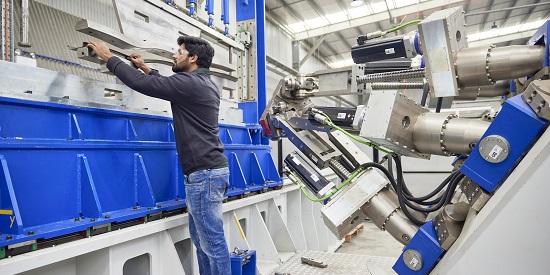$4.98m ARC funding brings circular economy training centre to Deakin
Media release
One of the Australian Research Council's (ARC) six new Industrial Transformation Training Centres will be headquartered at Deakin University, spearheading the development of more efficient and sustainable materials in the pathway to net zero.
The ARC Training Centre for Resource Efficient Alloys in a Circular Economy 'circAlloy' will be supported by $4,988,139 in ARC funding and will be led by Professor Matthew Barnett, Chair in Metallurgy at Deakin’s Institute for Frontier Materials. Professor Barnett is an ARC Laureate whose world-leading research team unlocks the potential of metals to develop longer-lasting, energy-saving alloys, for critical industries such as mining and construction.
The centres funded under the ARC's Industrial Transformation Research Program support and foster industry-university research collaboration to drive Australian innovation in priority areas and develop industry-focused researchers.
Deakin's Deputy Vice Chancellor Research and Innovation Professor Matthew Clarke said the new training centre was a fantastic coup for Deakin in its mission to deliver education and research that builds a better future for all.
'circAlloy will help us train the next generation in alloy science and manufacturing for resource efficiency in a circular economy, creating a much-needed workforce of the future,' Professor Clarke said.
'The production of solid materials accounts for 23% of global CO2 emissions with steel production alone accounting for 7% of global emissions. More efficient and more circular materials are needed.'
Research groups supporting the centre include Deakin's Institute for Frontier Materials and Applied Artificial Intelligence Institute, plus the Institute for Sustainable Futures at the University of Technology Sydney. Professor Barnett will be joined by centre deputy directors Professor Daniel Fabijanic (Deakin) and Professor Damien Giurco (University of Technology Sydney).
circAlloy will also bring together a consortium of industry collaborators, including Bradken Resources, Callidus, Bisalloy, Hystata, Dogood Austalia and FormFlow, who are committed to net zero via research and development and seeking skilled people to make the transition.
The centre will build on the success of Deakin's mineAlloy ARC Training Centre, also led by Professor Barnett.
'Metals are remarkable materials - malleable, strong, durable and highly recyclable. But despite those circular properties, the production of metals faces multifaceted challenges that put pressure on the environment and the economy,' Professor Barnett said.
'circAlloy will help us create alloys that stay in use for longer, enable a more circular economy and demand less resources, while at the same time facilitating innovation in renewable technologies. Nimble placement of researchers and research engineers on-site and in-lab will allow us to fast-track problem solving, audit processes, proof-of-concept testing, and the translation of research into real-world outcomes.'
circAlloy will have access to Deakin's state-of-the-art facilities and laboratories, as well as world class sustainability analysis and characterisation and testing.
The centre will also make use of Deakin's extensive pilot scale facilities, including the new fastAlloy Lab. This integrated rapid prototyping lab includes a vacuum suction eight-station arc melting furnace guided by AI, which can accelerate the development of new alloys from months to weeks.

